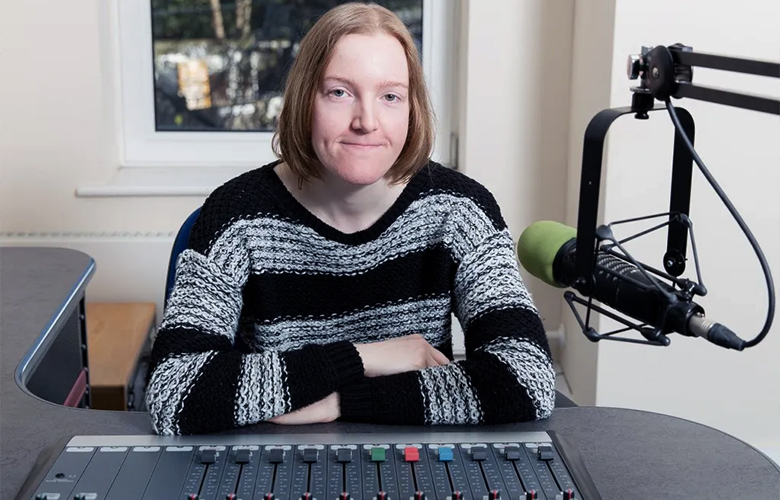
It’s a perfectly valid question, and it’s true that the vast majority of people I know working in radio and podcasting didn’t actually ‘study’ it at university. I did, though, and my answer is always the same, without hesitation: “Absolutely. And I’d do it all over again.”
My undergraduate degree was in multimedia, but I always knew I wanted to go down the audio path. I got involved in student radio from day one and loved it. I tried to get some industry work experience during the summer break between my second and third years and naively thought radio stations would throw open their doors to welcome me in. I thought wrong. Most were full and didn’t have space for any more interns for the foreseeable future; others never got back to me. It was then I realised it was going to be much harder to break into radio than I’d originally thought.
Around this time, I also realised there was so much more I wanted to experience. I’d been focusing exclusively on presenting music shows, but my interest in documentary was growing and I wanted to learn the ins and outs of speech radio. I began to think seriously about pursuing postgraduate study in radio and found what looked like the perfect course in the UK: a Master’s in Radio Production at Bournemouth University. What really sold it to me was the opportunity for students to run their own online radio station, which would be a platform for all work produced throughout the year. I applied, had an interview, and luckily was accepted.
Being an academic qualification, there was of course an element of theory, but this all contributed to my knowledge and understanding of the radio industry. On the practical side, we had 24-hour access to state-of-the-art studios and recording gear. As a small group of just seven students, we had the chance to collaborate closely on creative projects and experiment with different roles within production teams. Our lecturers had years of experience working for some of the most respected broadcasters. I was incredibly fortunate to have a BBC producer as my Master’s project supervisor, and thanks to the many industry speakers who came in to offer advice and wisdom, we made some amazing contacts. It felt like a really tight-knit, supportive community in which everyone’s interests and aspirations were nurtured.
The experience also benefited me as a person. It gave me confidence, life skills, and friendships that endure to this day. After many years of not considering myself a ‘beach person’, I also discovered that I loved living by the seaside.
It certainly was for me, but I believe my MA helped me get my foot in the door quicker than I otherwise would have. Not only that: it helped me stay there. When I started working professionally in the industry and applying the skills I’d learned at university on a daily basis, I could see just how important it had all been.
When it comes to having a career in this field, academic qualifications are definitely not a necessity, but they can be a great option. It really depends on your individual situation: whether or not you can afford it, what you think you might gain from it etc. It’s not a route that suits everyone. But for me personally, it was the best year of my life.
Caridad Espinosa: Creator of Mix Like a Girl


The mission of SoundGirls.org is to inspire and empower the next generation of women in audio. Our mission is to create a supportive community for women in audio and music production, providing the tools, knowledge, and support to further their careers. SoundGirls.Org was formed in 2013 by veteran live sound engineers Karrie Keyes and Michelle Sabolchick Pettinato and operates under the Fiscal Sponsorship of The California Women’s Music Festival, a 501(c)3 non-profit organization. In 2012, Karrie and Michelle participated in the “Women of Professional Concert Sound” panel at the AES Conference in San Francisco. The panel was hosted by the Women’s Audio Mission (WAM) and moderated by WAM founder Terri Winston. Terri brought together five women working in live and broadcast audio. The groundbreaking panel (which also included Jeri Palumbo, Claudia Engelhart and Deanne Franklin), provided young women and men a glimpse into life on the road, tips and advice, and a Q & A with the panelists. More importantly though, was how incredibly powerful the experience was for the panelists. We had all been in the business for 20 years or more, yet most of us had never met before that day and within minutes we bonded like long-lost sisters. We were struck by how similar our experiences, work ethics, and passions were and wondered why our paths had never crossed and how our careers would have been different had we been there to support each other through the years. Each of us are strong on our own, but together we were even stronger and a powerful force. We were empowered. Each of us had been asked hundreds of times in our careers: Are there other women doing sound? How did you get into sound? How would a young woman go about getting into sound? Through creating SoundGirls.Org, we hope to establish a place for women working in professional audio to come for support and advice, to share our success and failures, our joys and frustrations, and for empowerment and inspiration.
Read Full Profile© 2021 TheatreArtLife. All rights reserved.

Thank you so much for reading, but you have now reached your free article limit for this month.
Our contributors are currently writing more articles for you to enjoy.
To keep reading, all you have to do is become a subscriber and then you can read unlimited articles anytime.
Your investment will help us continue to ignite connections across the globe in live entertainment and build this community for industry professionals.